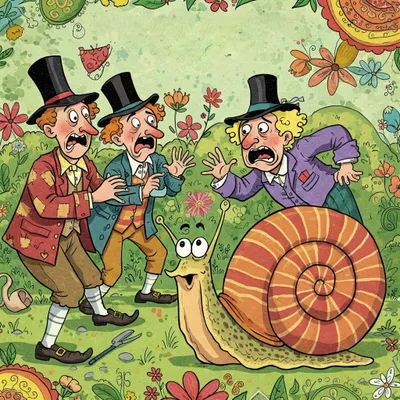Four and Twenty Tailors

Lyrics
Went to kill a snail;
The best man among them
Durst not touch her tail;
She put out her horns
Like a little Kyloe cow.
Run, tailors, run, or
She'll kill you all just now.
History and Meaning
"Four and Twenty Tailors" is a traditional English nursery rhyme with origins traceable to at least the 18th century. Related themes involving tailors and perceived cowardice appear in earlier sources, such as Samuel Foote's 1767 play The Tailors, suggesting the underlying joke was already established in popular culture.
The rhyme typically narrates a scenario where a large group of tailors embark on a mission to hunt or kill a snail. Despite their numbers, they are depicted as being frightened or unable to handle the creature, particularly when the snail extends its horns, which are humorously compared to those of a "little Kyloe cow" (a type of horned Highland cattle). The rhyme often ends with the tailors being urged to flee.
"Four and Twenty" means 24 is chosen as a number to mean 'a lot'. Counting in dozens (2 x 12) was common in that time. See also the rhyme '"Sing a Song of Sixpence," which uses a similar count "Four and twenty blackbirds baked in a pie".
This nursery rhyme is understood as a piece of satire, mocking the perceived lack of physical strength or bravery historically stereotyped upon tailors as an occupation. The humour arises from the absurdity and exaggeration of so many men being scared of a small, harmless snail.